 This spring, the San Francisco Gay Men’s Chorus presents “Passion” on April 1 & 2 at Davies Symphony Hall. “Passion” features three stunning premieres that span three centuries, from Walt Whitman and Mark Twain to World War II to Tweets!
This spring, the San Francisco Gay Men’s Chorus presents “Passion” on April 1 & 2 at Davies Symphony Hall. “Passion” features three stunning premieres that span three centuries, from Walt Whitman and Mark Twain to World War II to Tweets!
As Artistic Director Dr. Tim Seelig began to put the program together for these momentous concerts, he received a piece set to a Walt Whitman text from one of the singing members. He was immediately drawn to it and responded with enthusiasm. Another came his way and, ultimately, a song cycle of five pieces. He immediately shared it with a group of singing members, and they too fell in love. At that point, the decision was made to include them on the Spring, 2015 concert.
Below is an interview between Dr. Seelig and Steve Huffines, the composer of “My Friend, My Lover: Five Walt Whitman Songs.”
Tim Seelig: Steve, why did you choose Walt Whitman texts for your songs?
Steve Huffines: Because he’s the best! He’s one of the greatest, if not the greatest American poet. And he was gay.
Tim Seelig: What do you make of those who doubt his orientation?
Steve Huffines: People resist acknowledging he was gay, mostly because he was very macho: a man’s man. But his poems about gay sex are so explicit they were labeled pornographic! He also wrote explicit letters about lovers and tricks. He was photographed nude by Thomas Eakins. He played around with Oscar Wilde. He even gave his long-term partner a ring. So it’s pretty clear he was gay. What I love most is that he was completely unapologetic about it, even though times were very different then.
Tim Seelig: What makes Whitman the best gay poet in your opinion?
Steve Huffines: Whitman speaks very directly to 21st Century gay men. His texts are still as relevant today as the day he wrote them in the late 1800s. That’s really astonishing considering that these poems were written long before Stonewall, before the sexual revolution, before Sigmund Freud, and even before the invention of the word “homosexuality.” But while society was very different then, Whitman’s poems demonstrate that the longings, the anxieties, the hopes, the fears of gay men—all are remarkably unchanged. Poetry that perceptive and timeless is great poetry.
Tim Seelig: Can you give us examples of how the Whitman texts you chose to set to music speak to modern gay men?
Steve Huffines: Are You the New Person Drawn Toward Me? could easily be about a gym crush, turning someone into your fantasy rather than seeing them for who they really are. Native Moments sounds like someone out on the prowl for a hookup, maybe cruising on Grindr. We Two Boys Together Clinging is pure fun, like two guys on a cross-country motorcycle road trip living only for each other and laughing at anyone who expects them to conform. My favorite text is City of Friends, because it really describes what the San Francisco Gay Men’s Chorus is all about.
Tim Seelig: Other than the “gay” factor, what drew you to these texts?
Steve Huffines: Whitman’s poems have great characters, great drama and storytelling. They cry out to be songs, especially songs for a gay men’s chorus. He was hugely sexual and revolutionary. He was always rebelling against social conventions—particularly about sex and sexuality. Who wouldn’t want to set the line “I share the midnight orgies of young men” for a gay men’s chorus? It’s pure Whitman.
Tim Seelig: Did you change any of the texts from Leaves of Grass?
Steve Huffines: I would never dare. Whitman enthusiasts would have my head on a plate! The truth is that Whitman revised his poems frequently, and sometimes dramatically, over the course of his life. So we have multiple versions of many of them. My favorites—some of which I set (to music)—are the initial drafts in his own handwriting, before any publisher or self-editing got in the way. They are often much more directly homoerotic than the later, published editions.
Tim Seelig: What is it you hope for with these songs? What do you want to accomplish with them?
Steve Huffines: I would love for both the Chorus and the audience to walk away with a greater appreciation for the immense life-affirming joy in these Walt Whitman’s poems. Other than that, a laugh or two, and send them out humming.
For more information about the San Francisco Gay Men’s Chorus and their upcoming concerts “Passion” on April 1 & 2 at Davies Symphony Hall, please visit www.sfgmc.org
Recent Comments